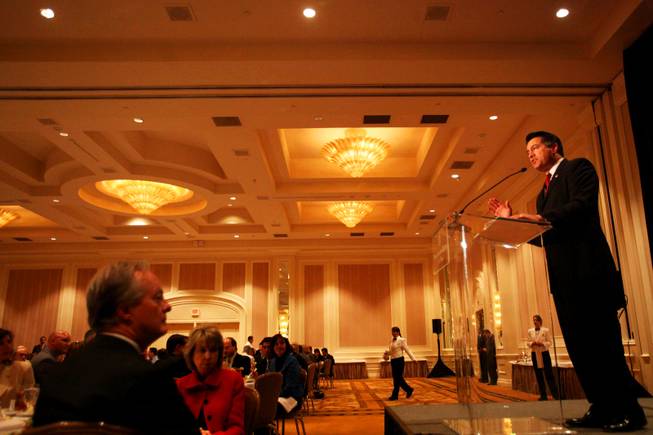
Gov. Brian Sandoval addresses the Las Vegas Chamber of Commerce Wednesday, January 26, 2011 at a luncheon held at the Four Seasons Hotel in Las Vegas.
Sunday, Jan. 30, 2011 | 2 a.m.
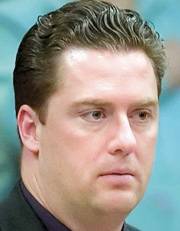
John Oceguera
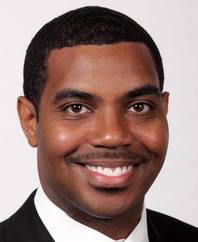
Steven Horsford
Sun archives
- Sandoval to businesses: ‘Raising taxes the worst thing we could do’ (1-26-2011)
- School officials warn of jobs cuts, larger classes under proposed budget (1-26-2010)
- School district warns of consequences if state redirects bond money (1-26-2010)
- Gov. Brian Sandoval’s budget means job, service cuts for Clark County (1-26-2010)
- Sandoval calls for education overhaul, job cuts in State of the State address (1-24-2011)
- State of the State: How doors could open for Nevada (1-24-2011)
- Is Brian Sandoval’s ‘shared-sacrifice’ budget the solution to state’s economic woes? (1-23-2011)
- Most vulnerable await budget cuts with trepidation (1-23-2011)
- Increasingly worried liberals seek pushback on Sandoval budget (1-21-2011)
- Construction industry: Raise taxes for job growth (1-20-2011)
- Groups seek higher taxes on tobacco and gasoline (1-20-2011)
- Sandoval warns of consolidation, job losses in state government (1-19-2011)
Sun Coverage
Beyond the Sun
Gov. Brian Sandoval’s suspicion that business leaders and Democrats have been secretly meeting to hatch a plan to raise taxes turns out to be true.
The Sun has confirmed that state Senate Majority Leader Steven Horsford, D-North Las Vegas, and Assembly Speaker John Oceguera, D-Las Vegas, met repeatedly last year with a group of about 10 business executives described as “captains of industry” to come up with ways to reform government and identify what taxes could be raised to address the state budget deficit, which some estimates put at $2 billion.
It’s unknown whether they met in a “Bat Cave,” as Sandoval told a friendly Las Vegas Chamber of Commerce crowd Wednesday.
The governor was calling out his critics, after Democratic leadership spent most of the week pummeling his budget and its cuts to schools, higher education and services to the needy. Democrats have for months said they don’t believe cuts alone can balance the budget without undue harm to state government and the services it funds.
Sandoval, who ran on a pledge not to raise taxes, told his critics that if they didn’t like his budget, they should place their cards “face up” and reveal their plan.
But Democratic leaders said it was too early for them to talk about raising taxes — at least publicly.
Privately, there has apparently been plenty of talk.
Many of the business leaders who met with Democratic leadership would only discuss the group on the condition of anonymity because the meetings were to be confidential. The group included, among others: Keith Smith, president and CEO of Boyd Gaming; Marybel Batjer, Caesars Entertainment’s vice president of public policy and communications; Billy Vassiliadis of R&R Partners; Tim Crowley, president of the Nevada Mining Association; and Steve Hill, past chairman of the Las Vegas Chamber of Commerce and, interestingly, also head of Sandoval’s economic development transition team.
“The majority leader and speaker wanted to know where we’re coming from ahead of this session,” Hill said. “The chamber wants to be part of the solution.”
Hill said at Horsford and Oceguera’s request the group met about 10 times over the better part of a year and discussed a variety of issues — consolidation of some state agencies and services, other government and education reforms and taxes that could potentially be raised.
Two taxes emerged as the most palatable, according to several members:
• a sales tax on services to reduce the sales tax on tangible goods: Currently, only tangible goods, except for most groceries, are subject to a sales tax. Services — from hair cuts to accounting and lobbying — are not taxed even though the economy has become progressively more service-based.
• a Texas-style “franchise fee” on businesses to replace the payroll tax: In Texas, the tax is based on annual revenue and exempts companies with revenue below $300,000. The group had not determined a similar number for a Nevada franchise fee. Such taxes are sometimes compared with a modified gross receipts tax, the tax former Republican Gov. Kenny Guinn proposed in 2003 and the Legislature rejected. Hill said the chamber, a leading opponent of the tax in 2003, still opposes a gross receipts tax, but views the franchise fee favorably.
The group made no formal agreement on a tax plan, members said.
“The implication that there is ... some grand plan that has been agreed upon is, in my mind, an inaccurate depiction of any of those conversations,” Hill said.
Crowley said the group was “kicking the tires” on such ideas.
Following Sandoval’s State of the State address and unveiling of his budget Monday, the Legislature began holding hearings on the governor’s plan. The Las Vegas Chamber of Commerce, the Nevada Mining Association and Nevada Resort Association — the largest gaming group — said they’re still assessing the budget. But all expressed immediate concerns about the level of cuts, particularly to education.
Sandoval’s budget includes cuts of 9 percent to school districts and 17.66 percent to higher education.
“We’re certainly concerned about the impact of the cuts,” Hill said. But “the governor certainly is right that it’s a very difficult time to raise taxes on anyone.”
The business leaders have not met since December. Members and lobbyists close to the group said the election, which saw Republicans make gains in the state Senate and Assembly and gave Sandoval something of a mandate, drastically reduced their odds of passing a tax increase. The retirement this month of longtime state Sen. Bill Raggio, R-Reno, further diminished their chances.
“I don’t know how the Legislature gets (a tax increase) through given the election results,” one member said.
Another lobbyist with knowledge of the group’s discussions said any tax proposal the group favored is unlikely to pass. “If it’s not dead, it’s on life support,” he said.
Republican legislators, however, have been mostly quiet on Sandoval’s budget in committee meetings.
The 2011 Legislature begins its 120-day session Feb. 7.
Oceguera and Horsford downplayed the significance of the group’s work.
“We’ve had lots of meetings with business leaders, formally and informally,” Oceguera said. He noted that lawmakers were listening to constituents on Saturday at hearings in Las Vegas and Reno.
But another member said “thousands of hours” were spent gathering data, examining the state’s finances and discussing potential tax increases.
Oceguera said the Legislature will go through a deliberative process and make more cuts, long-term reforms, develop an economic development strategy and “vision for the future.”
“Once we do all those things, we’ll see what the number is,” he said. To talk about taxes now, he said, “I think you’re taking a big leap.”
Horsford said last week that Sandoval’s budget cuts disproportionately affect lower- and middle-class Nevadans. But he, too, said it was early to talk about taxes. In a statement Friday, he added, “Any ideas that protect middle-class families, our kids, and our businesses should be considered ... That’s why I actively reach out to people from all across Nevada.”
The meetings with business leaders make sense from a certain perspective. High-ranking Nevadans who care about the state want to be on the same page, working from the same information.
Horsford and Oceguera need the support of such business leaders to have even a faint hope of raising taxes, which requires support of a two-thirds majority in both houses. (That would require three Republican senators and two Republican assemblymen, if Democratic leadership can hold all their members — which is also far from a sure thing.)
But with Sandoval obliquely accusing the opposition of clandestine meetings, the revelation of the elite group of business leaders also strikes a blow to Democratic legislators’ claims of transparency and openness about their intentions.
Indeed, Democratic leadership’s comments on taxes last week are reminiscent of the 2009 Legislature.
During that session, leaders opposed Gov. Jim Gibbons’ budget but waited until the final days of the session to introduce a tax increase. As late as April they still publicly said they did not know whether a tax increase would be necessary even though they had been working on a tax plan for months.
The justification for this strategy goes back to 2003, when Guinn announced before the legislative session that he would pursue a gross receipts tax and then watched as opposition mounted to his tax bill, leading to a notoriously contentious session.
(Ironically, Guinn’s leading advisers are advising Sandoval.)
Democratic leadership, moderate Republicans and many of the state’s largest businesses have said they believe that raising taxes is necessary to preserve state services, particularly schools and higher education.
The business leaders who met with Horsford and Oceguera forwarded a list of recommended consolidation ideas to Sandoval’s transition team, according to a source close to the administration. They never forwarded any recommendations on taxes.
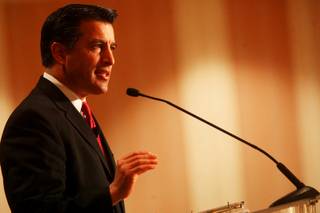
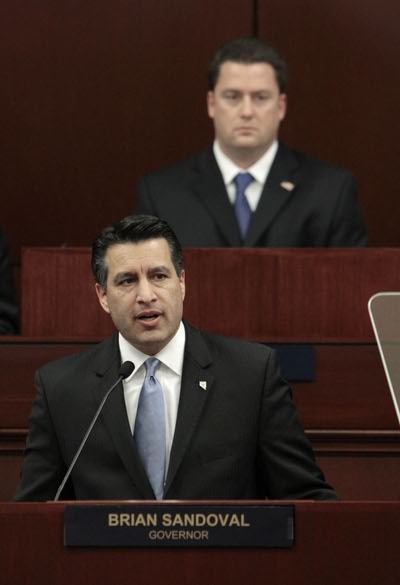

Join the Discussion:
Check this out for a full explanation of our conversion to the LiveFyre commenting system and instructions on how to sign up for an account.
Full comments policy